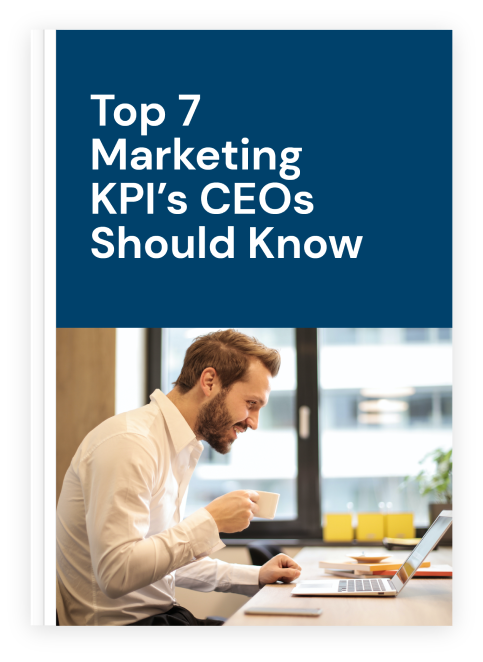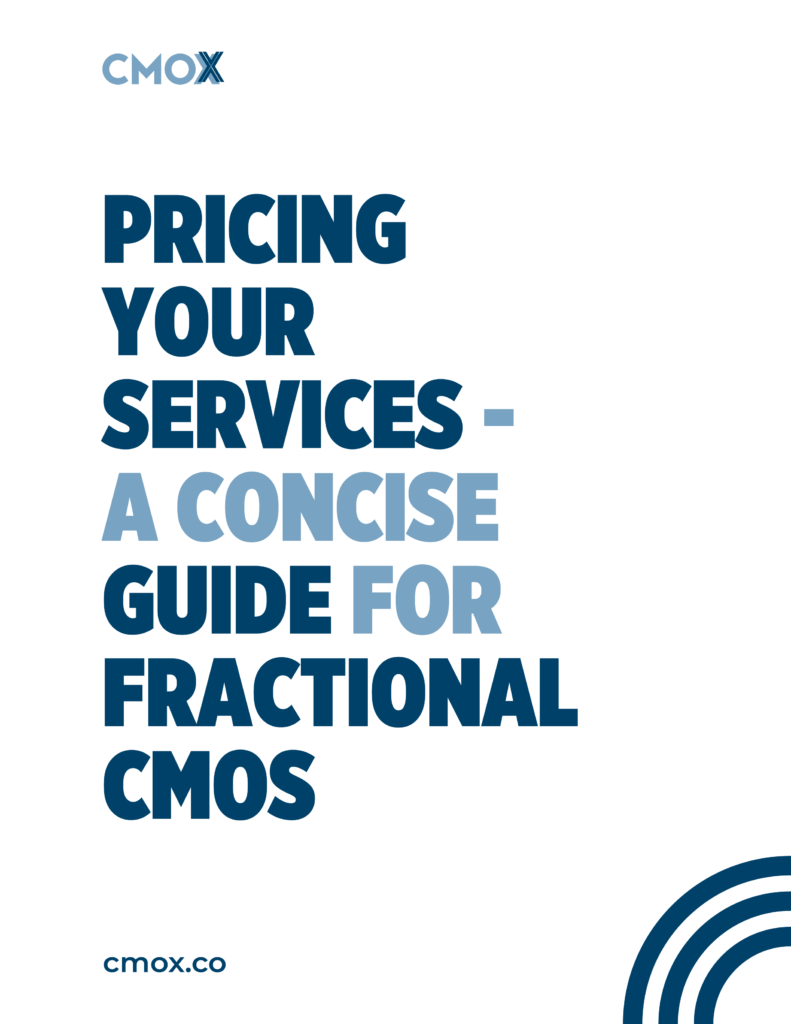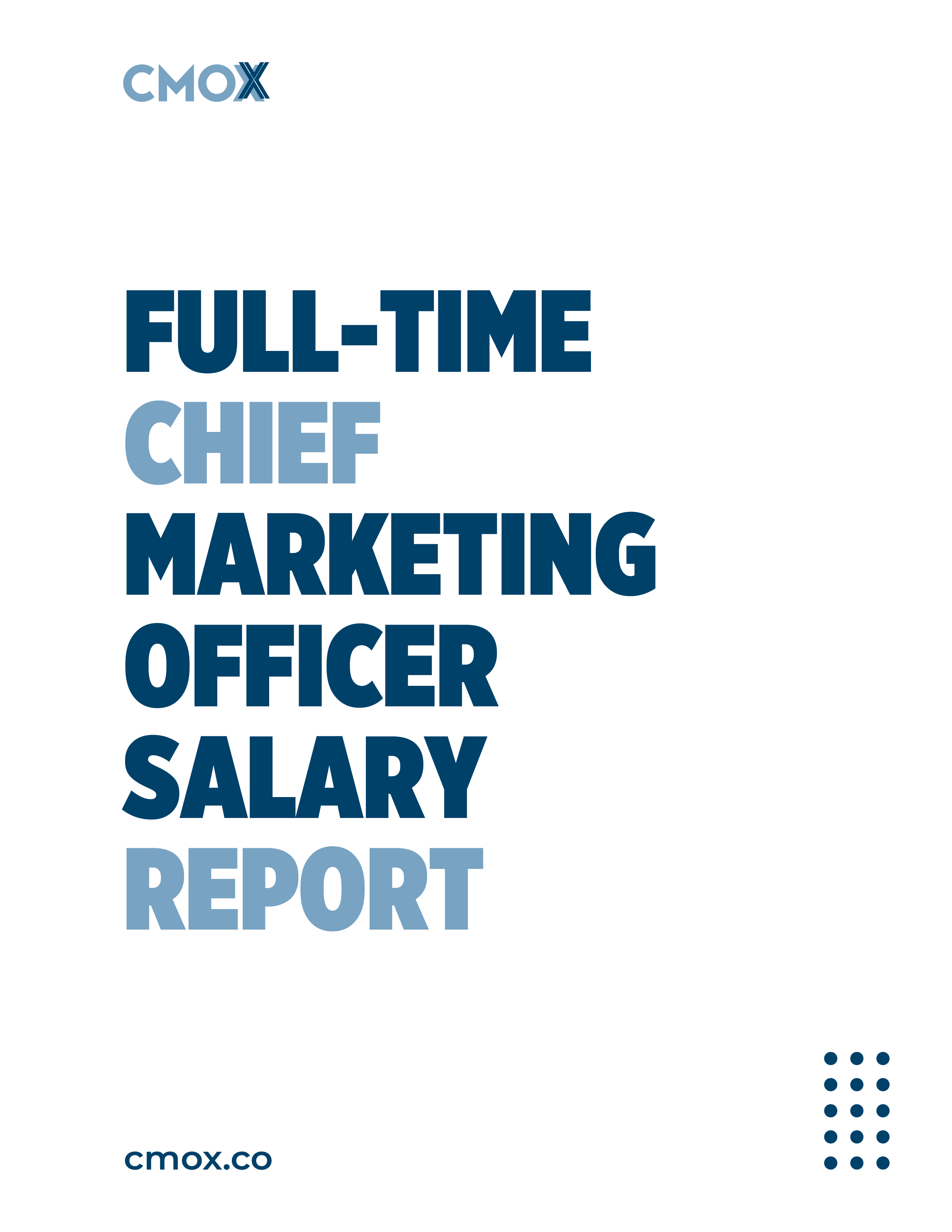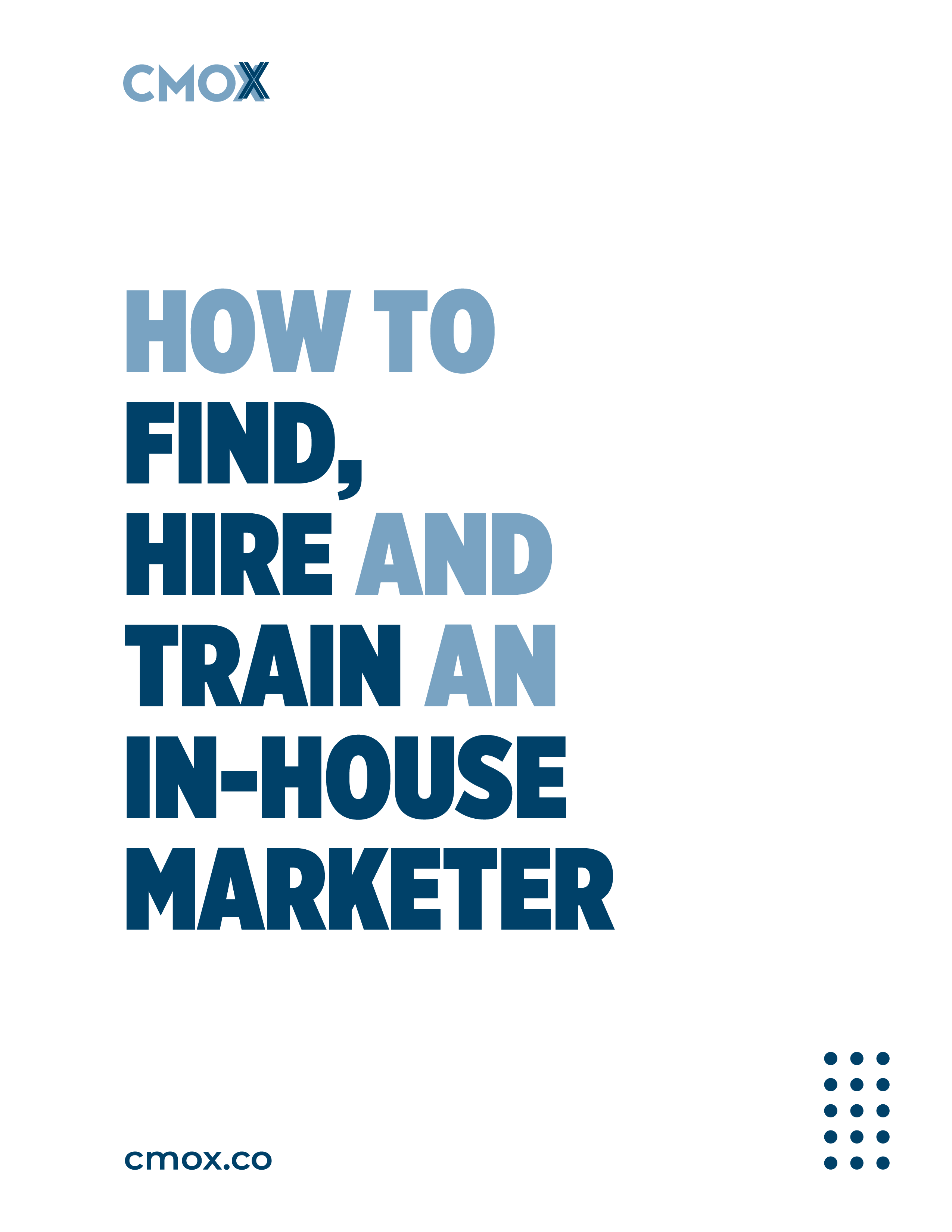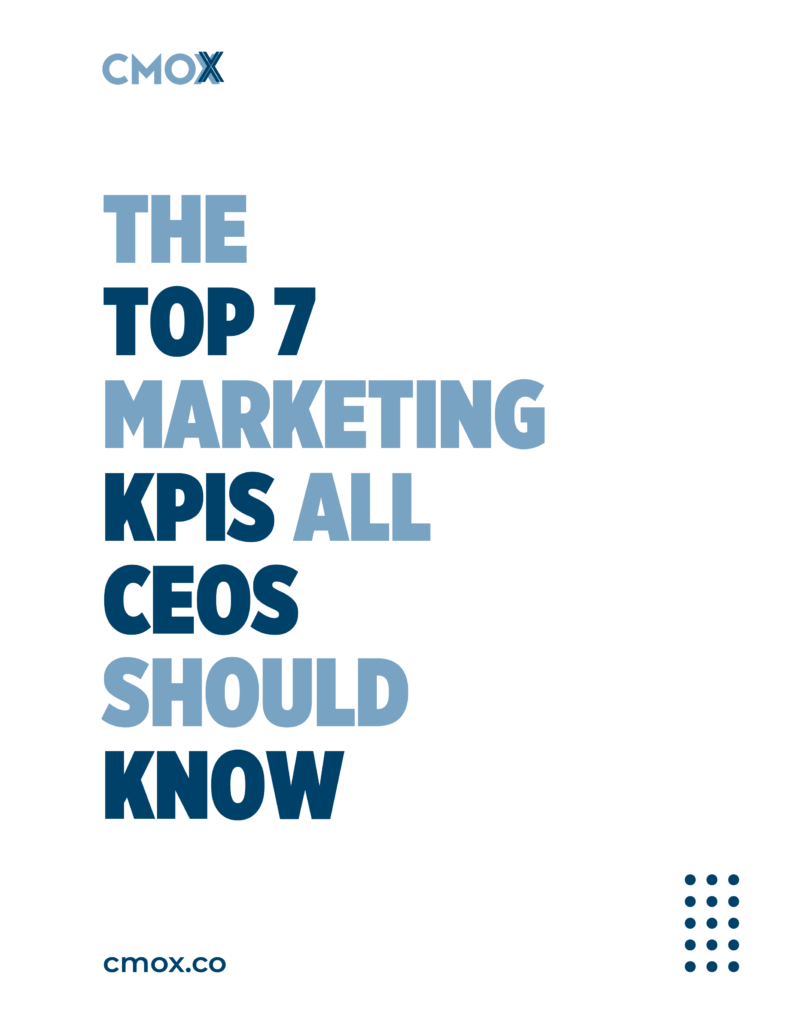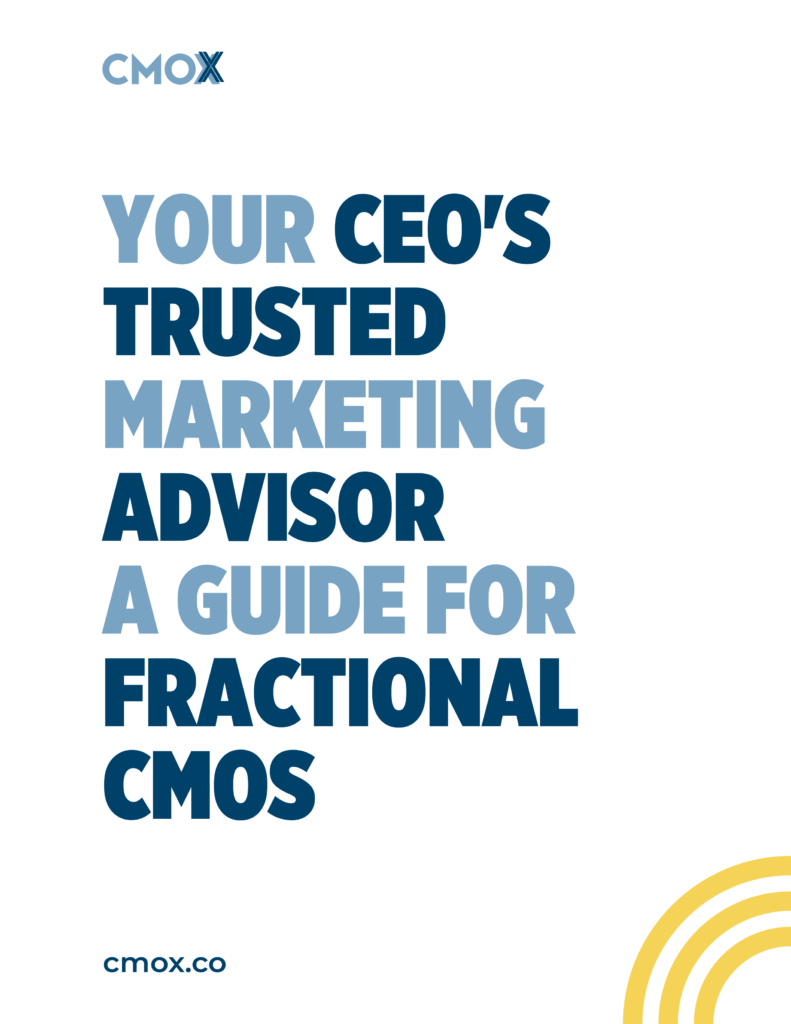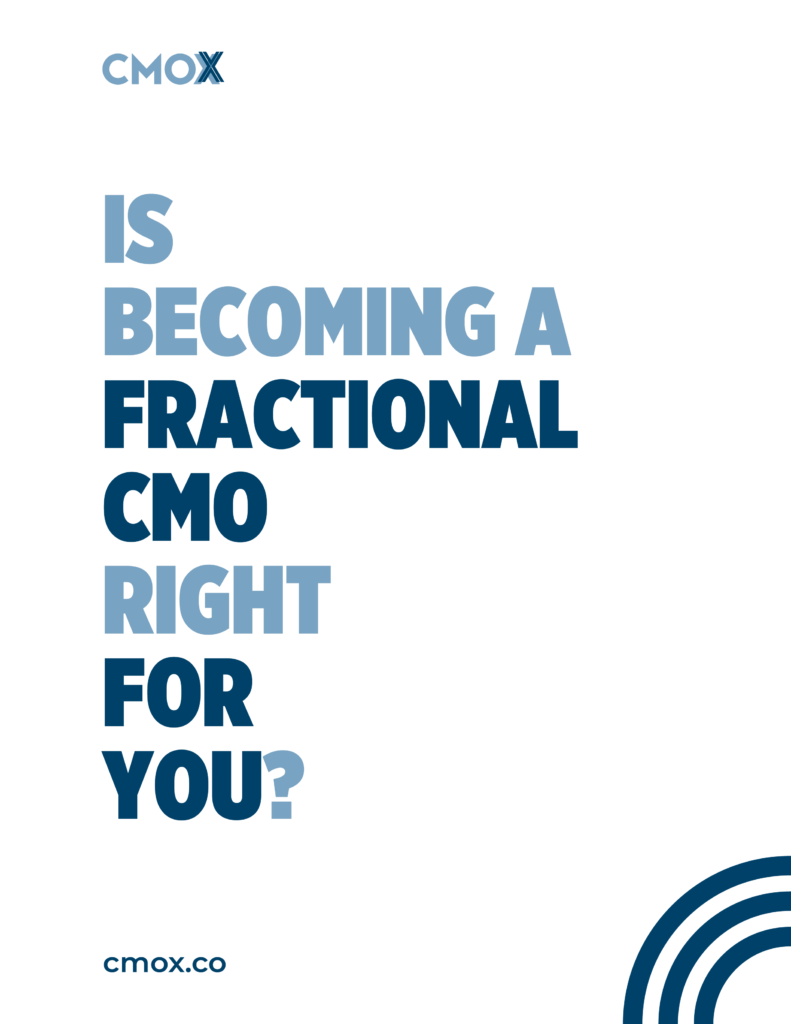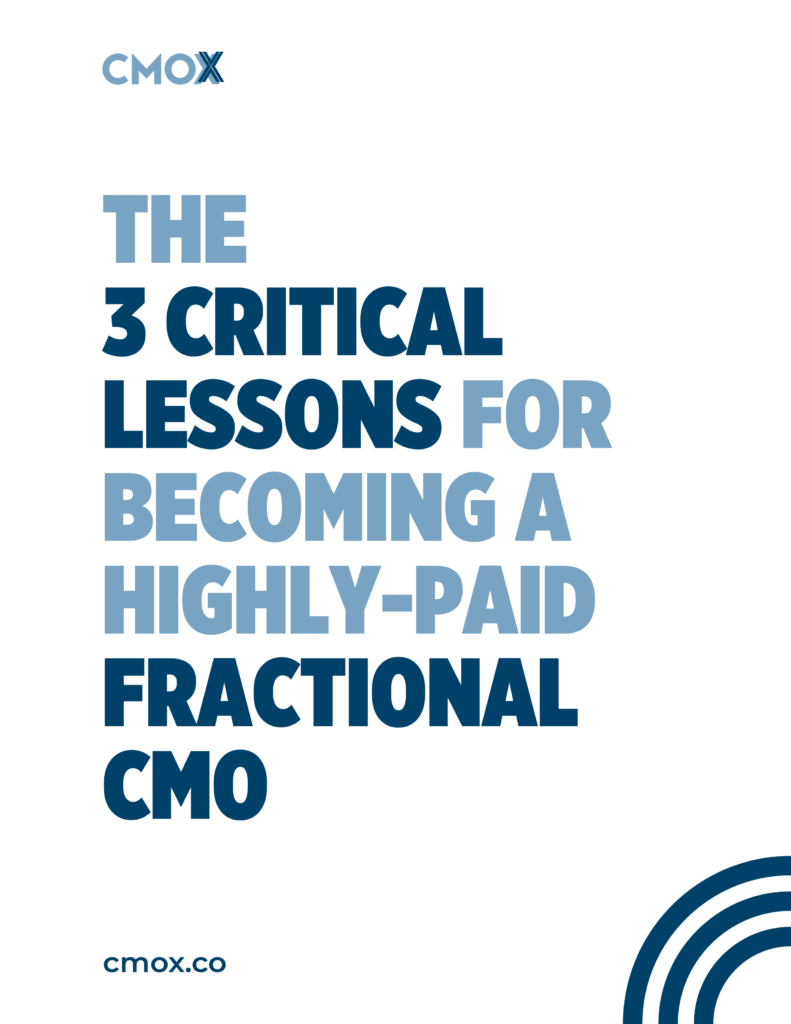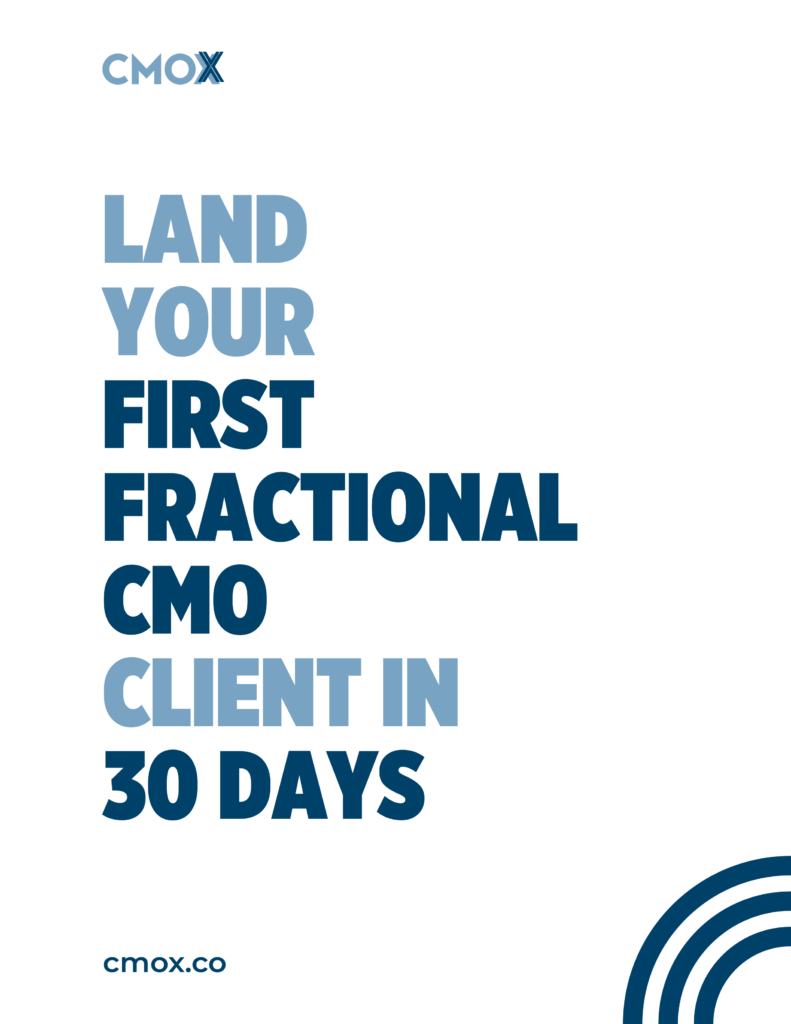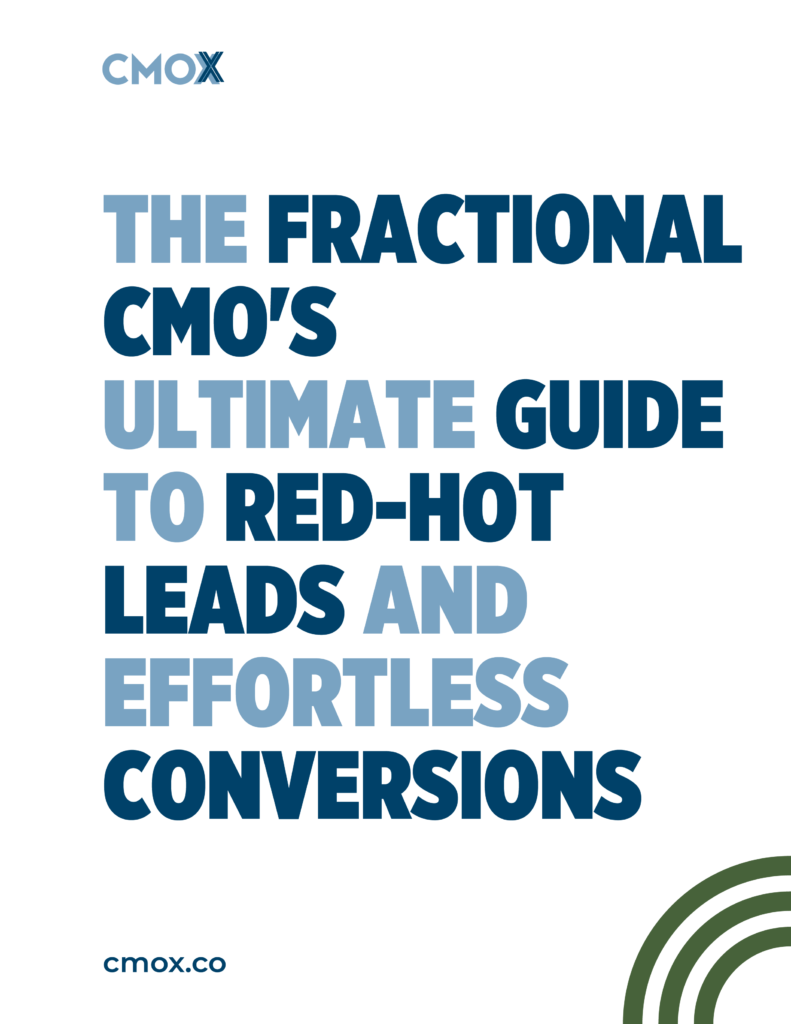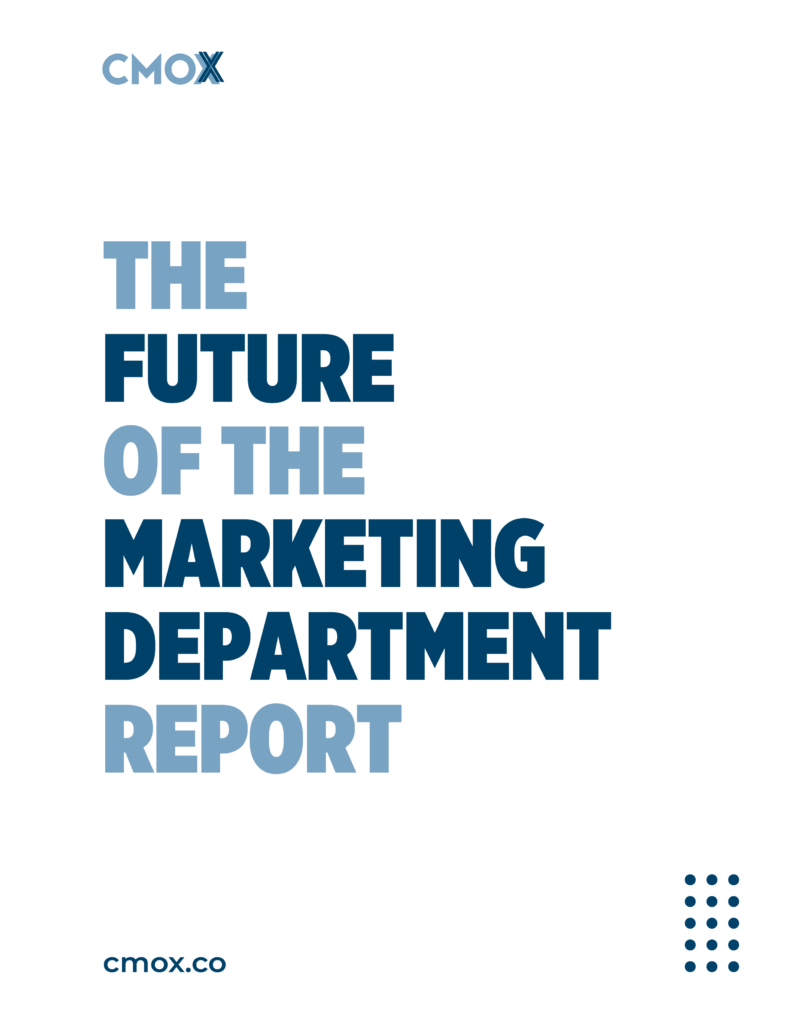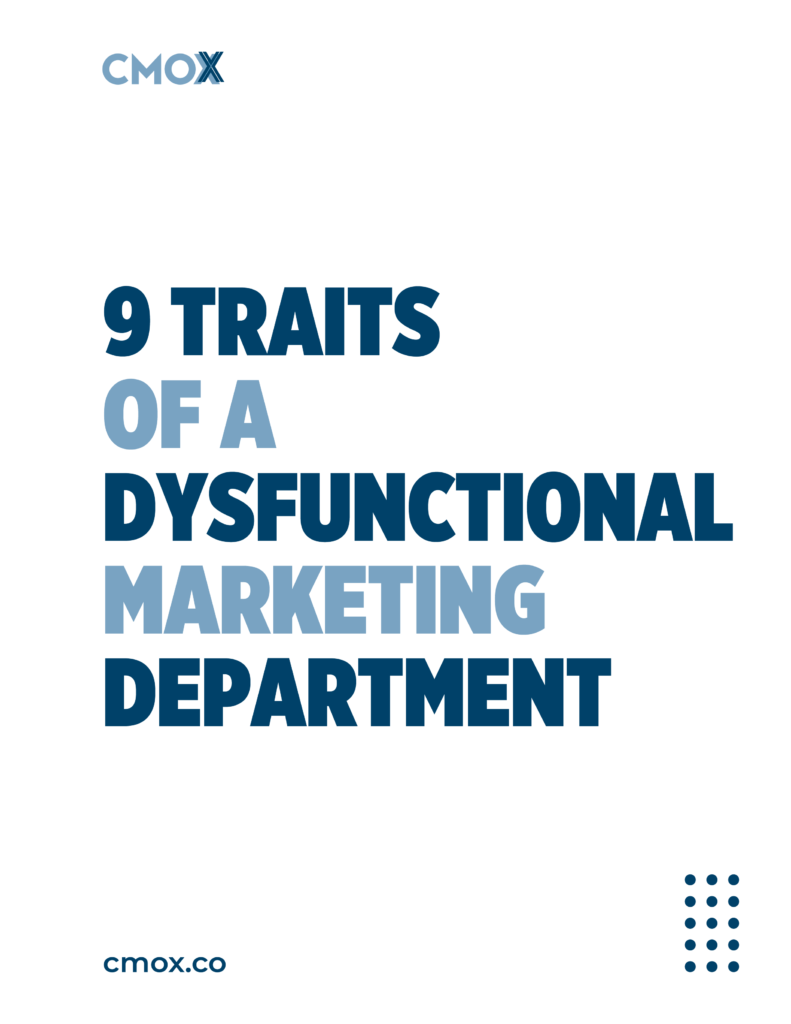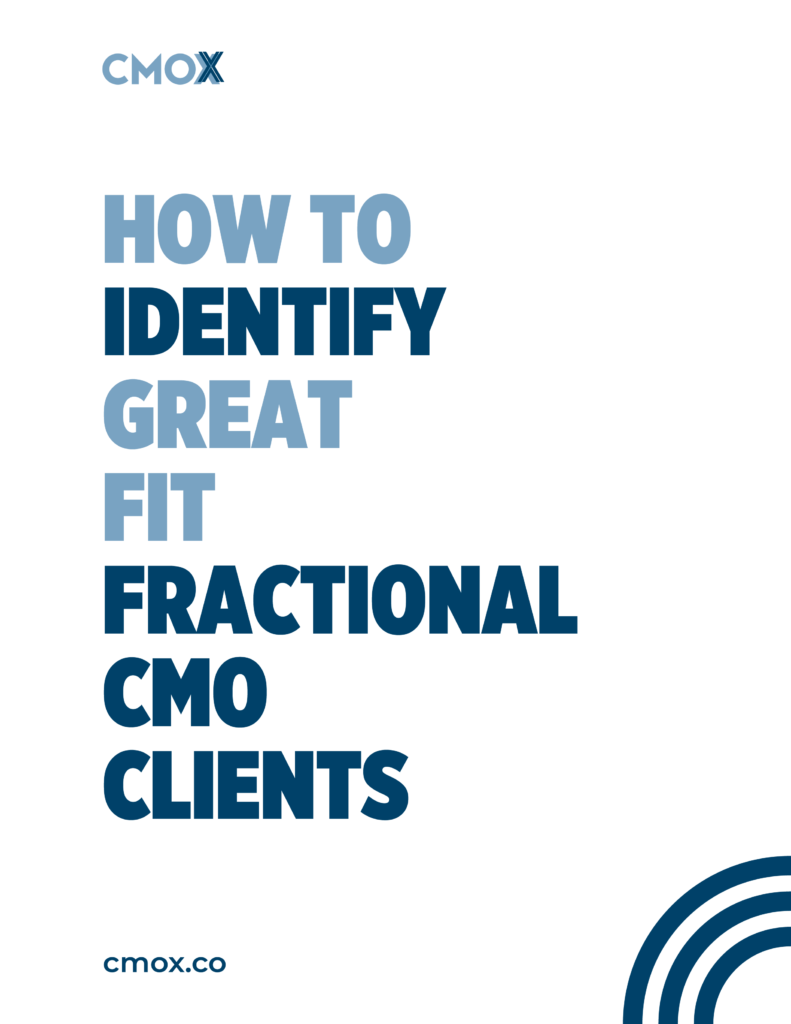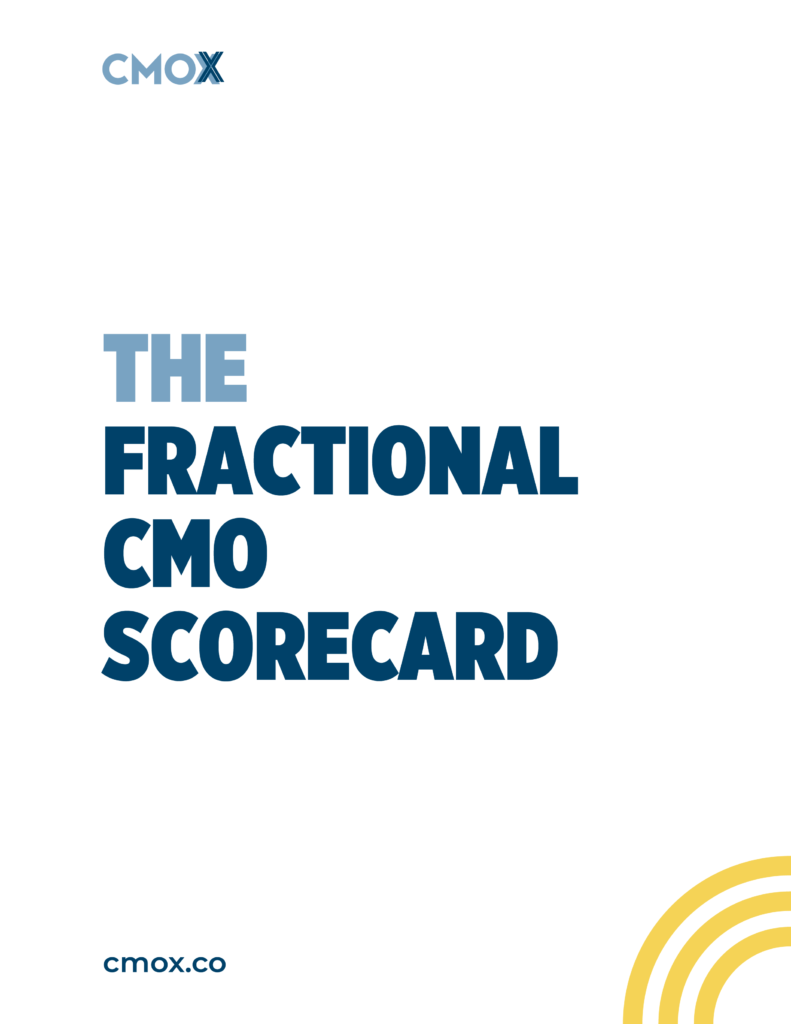Ep #121: How Real Fractional CMOs are Getting Rich Slowly

In this episode of The Fractional CMO Show, Casey Stanton breaks down what it really looks like to “get rich slowly” as a Fractional CMO - and why that’s a far better goal than chasing quick wins or sprinting toward burnout.
Drawing from real stories inside the Accelerator, Casey shares how members like Lisa, Ben, Sean, and Jennifer are building long-term, stable income by focusing on the fundamentals: selling high-value strategy (not cheap implementation), staying committed to a niche, and showing up with consistency and leadership - specially on their worst days.
You’ll hear how to move from overworked agency life to a calm, predictable business where one or two great clients can replace an entire salary. Casey unpacks what makes a “morally neutral or positive” business, how to price your work confidently, and why the right long-term contracts can eliminate money stress altogether.
Along the way, he reminds us that freedom doesn’t come from adrenaline or chasing every shiny offer - it comes from depth, focus, and relationships that compound over time.
Whether you’re just starting your fractional journey or ready to slow down and scale up, this episode is your roadmap to building wealth the sustainable way - one good client, one good contract, and one good year at a time.

Episode highlights:
In this episode of The Fractional CMO Show, Casey Stanton breaks down what it really looks like to “get rich slowly” as a Fractional CMO – and why that’s a far better goal than chasing quick wins or sprinting toward burnout.
Drawing from real stories inside the Accelerator, Casey shares how members like Lisa, Ben, Sean, and Jennifer are building long-term, stable income by focusing on the fundamentals: selling high-value strategy (not cheap implementation), staying committed to a niche, and showing up with consistency and leadership – specially on their worst days.
You’ll hear how to move from overworked agency life to a calm, predictable business where one or two great clients can replace an entire salary. Casey unpacks what makes a “morally neutral or positive” business, how to price your work confidently, and why the right long-term contracts can eliminate money stress altogether.
Along the way, he reminds us that freedom doesn’t come from adrenaline or chasing every shiny offer – it comes from depth, focus, and relationships that compound over time.
Whether you’re just starting your fractional journey or ready to slow down and scale up, this episode is your roadmap to building wealth the sustainable way – one good client, one good contract, and one good year at a time.
🔑 Key Topics Covered:
- Why “getting rich slowly” is the real path to lasting success
- The danger of chasing quick wins and constant reinvention
- How long-term contracts create calm, predictable income
- The shift from implementer to true marketing leader
- Building a business that works even on your worst days
- Why simplicity and focus outperform endless hustle
- The power of working with “morally positive” clients
- How real freedom comes from discipline and depth
- What it means to grow steadily instead of sprinting to burnout
- The mindset that turns short-term chaos into long-term wealth
Transcript:
00:00:00 Casey: In this episode, I’m going to be talking about what it really looks like for some of our members inside the Accelerator that are getting rich slowly. And I want to be clear that this is not a get rich quick thing. This is about building a real, sustainable, long-term, lasting, valuable business that you’re going to be able to hold on to despite the rise in AI adoption and the mass layoffs that we’re seeing all over. Let’s get into it.
00:00:23 Casey: Marketers of the world, why do we work hard to solve small problems? Why do we reinvent ourselves and our clients over and over? And why are we giving away marketing strategy for free? With advancements in AI, we’re all seeing the marketing department shrink from the bottom up and companies need you to serve them as their fractional chief marketing officer. It’s time to solve bigger problems and bring home a bigger paycheck. It’s time to create the lifestyle we deserve and to make a greater impact.
00:00:56 Casey: This is the Fractional CMO Show and I’m Casey Stanton. Join me as we explore this growing industry and learn to solve bigger problems as marketing leaders. The Fractional CMO Show is sponsored by CMOx, the number one company to teach you how to attract, convert and serve high paying fractional CMO clients on your terms.
00:01:20 Casey: Hey, it’s Casey. Welcome back. I want to talk to you about something that I saw in the news recently. So, there are 15 companies that had recent layoffs. Let me just tell you what they are. UPS, 48,000 employees. Amazon, up to 30,000. Intel, 24,000. Nestle, 16,000. Accenture, 11,000. Ford, 11,000. Novo Nordisk, 9,000. Microsoft, 7,000. PwC, 5,600. Salesforce, 4,000. Paramount, 2,000. Target, 1,800. Kroger, 1,000, Applied Materials, 1,400, and then finally Meta, 600. And those 600 from Meta specifically came from their AI lab, not their super intelligence lab, but their AI lab.
00:02:08 Casey: Major, major layoffs happening. And they’re just kind of churning, right? And the news cycle right now is just so busy. And there’s so much that’s going on right now. You’ve got the war in Israel-Palestine, you’ve got the war in Ukraine, you’ve got the war in Sudan. You’ve got like all of these major conflicts happening, plus all the stuff that’s happening in the United States around the government shutdown. Plus the holidays are coming up, plus these tariffs with China and Canada. And it’s just like, it’s a crazy time right now to try to sift through the noise and find kind of what… like find the signal in the noise.
00:02:49 Casey: And I want to provide that for you. I want to tell you what I’m seeing. So first and foremost, this big idea here is that being a fractional CMO, you’re not going to get rich overnight. But I really do think that you stand a solid chance to get rich slowly and you’re in control the whole way. And that’s such a big deal in this time of great instability that you can kind of relax into something that works and you can work for years somewhere.
00:03:19 Casey: Now, again, I don’t believe like my father did that I can have a job for the next 25 years, like by working for somebody else that doesn’t exist. Right? My dad was at IBM for 25 years and retired. I don’t have that opportunity. I don’t think you have that opportunity. I think what the world looks like in 25 years is just kind of anyone’s guess. But we can see two or three years out. And I think you can lock yourself into two or three year long contracts with folks.
00:03:48 Casey: Take for me, for example, probably the day that this episode comes out, I’m starting with a new client and we’re locking into a three year contract. It’s pretty nuts. It’s a long contract. Let me tell you though, any money stress in my life is just gone when I have long-term contracts. Right? And like, sure that something could happen to the contract, the person could disappear, they could not pay me. There’s plenty of problems that could happen, but I’ll tell you that my level of confidence with these people, because I know them, I think pretty well. We’ve had real honest conversations. I’ve looked at the P&Ls, I understand the balance sheet. I know where the business is.
00:04:23 Casey: My confidence is that I can build this fractional CMO practice and keep it super, super simple and make really great money on it and not have to worry about money. And I’ll tell you that the clients that I work with personally are absolutely morally neutral, maybe slightly morally positive, certainly not negative. And I think that’s an important thing. I’ve mentioned it before, but I think it bears repeating that you can go work with companies that you’re not making a huge impact with.
00:04:56 Casey: Let me say that like this emotional impact, like you feel like you’re doing good in the world. Like you’re working with a nonprofit that’s like providing water to people in countries that don’t have access to fresh water. It’s not that work. It’s just like good work that pays well. And you get to build a team, support the entrepreneur and support all the customers and enjoy it and make good money along the way. And then with the rest of your time, you can go donate that.
00:05:23 Casey: I saw a book that came out from the Ram Dass Foundation, the Love Server Remember Foundation, and I reached out to him. I reached out to the executive director there. I texted him and I was like, “Hey, congratulations on the book release. Let me know if I can help.” And we have a call scheduled for next week. And I’m just going to give them my ideas and help them out and probably spend a day just playing around and building some stuff for them. It’s for me to go play in the sand. I get to go do that stuff because I care about what they’re up to and I want to see them successful, but I also don’t want to ask them for money because it’s a foundation and they should spend that money doing other stuff instead of paying me. That’s how I see it. So I freely support organizations that I believe in.
00:06:00 Casey: And again, this is my belief here that I think you should be full priced and that price should always be increasing every new sale, every quarter, every year, certainly increase your price or be completely free. Those are my relationships, full price or free. That’s where you want to be. I met a great photographer when I was in Albania and he wanted to kind of host his own photography events and I peeled off some time with him and I kind of chased him with it. And I was like, Hey, like, I want to see you host these events. And he’s like, okay, like what is the profit share? What percentage of the profit do you want? And I was like, zero percent. I want none of your money. I will never ask you for a dollar. And I want you to ask me for any help that you need. I’ll say no a lot, but I’ll help you where I can and when I want to, but it’s just for the joy of it because I think it’s really special. I think he’s really good. I want him to do it.
00:06:53 Casey: So as I record this, he is doing his first workshop and I helped him get it launched and that feels meaningful and that feels great and helpful. It didn’t take me a lot of time. All in what 10 hours to kind of talk to him and work them through it and write some copy for him and that kind of stuff. I just had some fun with it. Now he’s off to the races and he launched it and I couldn’t make this one, which I’m kind of bummed about. But hopefully the next one I’ll be able to attend.
00:07:18 Casey: So that’s the kind of work that you can do as a fractional CMO is like you can go support the companies that you want freely for free. And then also have these morally neutral or morally positive companies that you work with that you make great money with. Certainly you’re making great money with them. And like what’s morally neutral? I think plumbing is morally neutral, right? I mean, maybe you could say that it does good in the world. I guess there’s a way that you could say that. That’s fine. Maybe selling SaaS is morally positive. Sure. But it certainly isn’t negative. So I think you can work in that way and just have a really good lifestyle.
00:07:51 Casey: And it’s get rich slowly. It’s about getting a client. First one, right? We talk in CMOx about becoming sales ready, knowing what you’re selling, who you’re selling to, how to sell, et cetera. And then getting that first client, kind of by any means necessary. And oftentimes people get that first client and it’s an imperfect client. It’s an imperfect fit. And I could tell them, Hey, it’s imperfect for these reasons, but that’s not helpful. What’s helpful is for them to sell it, collect the cash and then work with them for 30 days and then have them turn back to me and say, Woah.
00:08:21 Casey: Let me tell you about one of our members. So Lisa is one of our members and Lisa just closed a client and that client’s at 10K a month. And I’m really proud of her. She’s worked really, really hard to win this deal. And she sent me a message in boardroom. She and I have a little bit of a private chat and she said, I can’t believe I’m only charging 10,000 for this. I’ll tell you when she joined the accelerator, 10,000, I think was way out of her purview of what was possible. And now she’s charging 10,000 and she’s like, the next one has to be at least 15,000. That’s where she’s at. She understands the value that she provides in that short amount of time that she works with that client, which is like 10-ish hours a week. So pretty incredible to think of that landing her first client and immediately saying, severely undercharged despite charging $120,000 a year. Pretty cool. Not uncommon.
00:09:15 Casey: And there’s different types of people that do that. There are the people that come into the Accelerator that think they’re more talented than they are, which I don’t think is a bad thing. So hear me out. They come in and they think like, I can do it. Shoot, I’ve worked in this company, this industry, this agency, whatever, for so many years. I can just crush this. I’m the guy. I’m the woman. I can do it. And they go out and they swing a big deal and they win it. And then they figure out that they actually have to level up their ability to service them, but they sold it. And then they got to make good on the sale. I mean, I think there’s probably some more late nights of them working to get up to the level than they were expecting, but they get up to the level and they maintain the client relationship.
00:09:56 Casey: And then there’s the other people who come and saying, Oh, I’m going to charge a small number. I’m going to charge five grand a month for 10 hours a week, something like that, like five grand. Like, Ooh, that even feels like a lot. And those folks takes them a little while to build up that confidence. Usually at least the first sale is required and then they have the confidence. I’ll tell you charging $10,000 a month for your first gig to me is still so crazy. Cause my first one was 7,500 and I was working probably close to 20 hours a week. And I had Raph with me who still works with me at CMOX, but he was like my assistant at that time.
00:10:28 Casey: And you know, I had a lot of overhead to have Raph and I had that one client 7,500. So when a CMO comes in and they swing their first deal as a single Pringle without any support on their side, like no assistant, no overhead, and they’re charging 10,000, it’s a big deal. So I think that’s awesome. So that happened with Lisa.
00:10:50 Casey: And then we’ve got another one, Ben. If you listen to maybe the 200th podcast episode around there, Ben shared some of his experience with winning some big clients and seeing his revenue grow. And that’s super exciting. But it’s not the sprint that I’m excited about. Like certainly hitting those big numbers is great. But that’s kind of getting rich fast, right? Ben has been able to maintain those relationships. And that’s the key here. The maintenance, the maintaining, the getting the clients to continue to renew. That’s where you gotta be. That’s where you gotta go fight.
00:11:27 Casey: So it’s not about just winning the client and saying, did it. Because there is some renewal term in your contract, whatever is written in there. The more experience you get, the better you get. I want you to have long-term renewals, like 12-month renewal terms or 24-month renewal terms or something like that. But for Ben to maintain that revenue is a demonstration of his ability to serve the client, but also to continue to build a bigger future for them that includes him. It’s a big deal.
00:11:59 Casey: So maintaining big revenue arguably is more important than hitting big revenue. But we’ve seen people in the Accelerator come in and get up to 80, $90,000 a month, which is crazy, especially when these people were making 150, 200 grand at their last job. And they just speed run to 80, $90,000 a month, crazy numbers on a very small team with low overhead. They’re probably pocketing, let’s say 60 of that, 70 of that. Those people don’t often last at that level because they went from zero to hero overnight and they just don’t have the systems in place to be able to maintain it. So inevitably they lose a client and then another one and then another one and they kind of go up high and then they go down to a midpoint and then slowly build the way back up.
00:12:49 Casey: And there’s nothing wrong with that. I think there’s some reputation management that you want to consider. Certainly life is very different when you’re bringing in $60,000 a month in your pocket right before taxes. That’s a very cool place to be. But if you do it at the cost of burning some relationships, maybe it’s not worth it. And maybe if you took an extra six months to get there, it’d be better. So I’m not a huge fan of you taking on too many clients back to back.
00:13:20 Casey: My preference is that you take on one new client a year. That’s where you want to get to. To get started, you got to take on more clients than that if you want to get to a load of three to five clients. But then after that, you just want to cycle out one a year and just add a new one every single year. Your life is really simple. That’s what I’m looking for for you. Like simplicity is so important here. The way that I show up for clients is the same for all my clients. The way that our CMO show up is the same for all their clients. It’s not like they have to go change their clothes and pretend that they offer different services for different clients. Like, oh, for you, I offer CMO stuff and copywriting. And for you, I do CMO stuff, plus I have an agency. And for you, I do CMO stuff, plus I coach the sales team. Like, they don’t really do that. They just show up as the CMO for all the clients. And either the client gets them for a couple hours a month or 10 hours a week. That’s it. And they just do what they do.
00:14:13 Casey: So that is a level of simplicity that’s helpful. I mean, to me in my life, it’s really critical right now. Just with all the stuff that’s been happening in my personal life with my dad and just with travel, and now we’re getting into the winter holidays. I just don’t have the time to be like my most creative self. I’m kind of tied up mentally on all these other things that are going on. So the last thing I want to do is have to live in a world where my income is predicated on my ability to be radically creative every single day. I just don’t have it. Some days I just don’t have it. Sometimes I wake up a little tired and I just kind of chug through the day kind of barely getting through and I just, I just need a nap, right? Like it’s tough.
00:14:56 Casey: I want to have a role where I’m still valuable when I’m that person. That’s what you can do as a fractional CMO. So I think that that’s an important consideration. I’m optimizing for my worst days. Right? Like I’m trying to build a business that supports me on my worst days, not a business that supports me on my best days. That’s easy. It’s just the worst days. That’s the one. That’s the one where you’re backlogged on email. How do you make sure that something bad doesn’t happen? Like you don’t miss something critical, right? That kind of stuff.
00:15:28 Casey: All right. Let me tell you about another member. His name’s Sean. ahSean came into the accelerator and said, I don’t know what industry to be in. And he came as just kind of a blank canvas. And I questioned like, what was your experience or whatever? And we just kind of couldn’t find anything that was really strong for him. So I offered an industry for him that he hadn’t ever considered that I think is a strong one. And he’s like, yeah, let’s do it. I’m in. And I didn’t understand his level of commitment. Oftentimes people come into the Accelerator and like their level of commitment, just like, isn’t big enough. They’re not committed. They’re like, they’re kind of dating it. They’re kind of like watching it on TV while they’re playing on their phone.
00:16:10 Casey: Sean went in, he went hard. He flew a couple months ago to a conference and I was like, oh wow, that’s big. Like those conferences aren’t cheap. You’re going to spend a couple grand to do that. Sweet. And then come to find out he’s coming to my town to go to a conference. So we got together and it was awesome to see him. And we were out for a walk in Philly and we were walking through old city right through Washington Square Park. And I asked him, what’s your outcome for this conference? And he’s like, well, it’s like just like two hours tonight. It’s a full day tomorrow and it’s a couple hours the next morning. I want to get 18 booked appointments out of it. That’s hungry. That’s hungry to get 18 booked appointments out of it.
00:16:54 Casey: I talked to him afterwards. He had held 11 and he was still working to get the rest of them scheduled. 11 is a good number on such a short day. Like a really just… like a full day and then just a little bit before and after. He was able to get 11. That’s a level of commitment of someone who’s just showing up. He recently won a client. And the first time he won a client, he wasn’t too proud of his delivery to that client. And he went back and made it right and delivered something that he was proud of. And now he’s improving it and he’s asking really great questions to make sure that he delivers to this new client something even better.
00:17:31 Casey: So that’s something that I think is important. This idea of like, if you’re not embarrassed by your first delivery, you’re probably moving a bit slow. And there’s a line to that, which you have to consider. I pulled that kind of from Reid Hoffman’s quote about, you’re not embarrassed about your first product launch, you probably launched too late. I think that’s true. And I think there’s a way to make sure that you do a great job with the client. But regardless, Sean went back and he’s continuing to fight and he’s staying in the game and he’s staying in the conversation.
00:18:11 Casey: And success, I would say is absolutely predicated, not on some quick fix, though the shortcuts of all the stuff that we do in the Accelerator is incredibly useful and will absolutely shave, I would wager years off of your time. But also just time in the game. Like if you really want to dominate a niche or an industry and you want to get past just referrals for business, you have to be somebody, you got to be the person that people think about when they think about a problem. And that takes time to build. And that takes real relationships and real people that you’re talking to. So just consider that. And Sean’s a great example of that. Someone who’s just like locked in, focused, working hard and doing whatever it takes.
00:19:49 Casey: We also have a new member, Jessie, who came out to the world that she’s doing fractional CMO work. She joined the Accelerator and she considered what she was doing. And then she just kind of went public with it and told the people. And when you’re the kind of person that declares something and follows through on it, people’s attention gets magnetically attracted to your announcement. If you’re the kind of person who changes who you are every other day, not really helpful.
00:19:26 Casey: If you’re selling AI implementation services and now you’re cheap ETs, now you’re selling ad creatives, now you’re selling whatever, and you keep reinventing what you’re doing in marketing, people kind of see that almost like you’re like a hobbyist instead of a professional. And Jessie came in and she’s got a great business she’s doing very well before she joined the accelerator. But she decided, you know what? This fractional CMO thing is the move and she went public and she posted about it just on LinkedIn. And that got the attention of a qualified lead and she got to go work that lead. She continues to work it, maybe it moves on to a sale.
00:20:04 Casey: But that’s an idea here of just committing to something and doing it and being the kind of person that follows through. I don’t like to tell people what I’m about to do. I like to show them what I’ve done, generally speaking. Right? And I think that that’s a better place to be. Don’t tell people what you’re going to do. Show them what you’re doing or what you have done instead. I remember when I was working on my first book, the Fractional CMO Method, I remember just like telling people and feeling so good about it. I was like, I’m gonna write a book. I’m going to write one. I’m going to write one. People are like, oh, that sounds cool. And I was like, yeah, that does sound cool.
00:20:41 Casey: And after a while I was like, shit, I got to write a book. Right? And then it’s about like, oh, I just finished half the book. That feels interesting, but kind of no one cares. And then finally, when I launched it, do people actually care? Does the level of response I got from folks actually meet my expectation of what I think someone of value should be doing? Someone’s like, oh, I’m going to do this thing. I’m going to apply to law school. It’s like, okay, cool. Let me know when you’ve applied. You know what I mean? Like, let me know when you get into law school. Like, show me the outcome of your work. Don’t show me your idea, because ideas are cheap. So it’s like your commitment. Commit less often and commit only in big ways. That’s why I committed to be a fractional CMO. And I haven’t changed that. I’m a fractional CMO. That’s like who I am.
00:21:33 Casey: We’ve got another member, Daniel, and he is in one industry very tightly. When he joined the Accelerator. He was in that industry and he’s kind of continued to stay in that industry. It’s a good industry. However, he had a conversation with a company that is in a completely different industry. Think of medical versus home services. And he just closed this home service company and it’s awesome. And he’s doing it in the methodology of CMOx. Kind of what we refer to as the holy book of how to do it, which is delegating everything except leadership, practice predicting the future, solving bigger problems, the big three, that’s what he’s doing.
00:22:15 Casey: And that’s allowing him to get out of the day-to-day grind of kind of agent, it’s like pseudo agency work and just be the fractional CMO. I don’t think I’m speaking out of turn here. I think it is just generally hard for folks that come in that have been selling folks in the agency model… like there’s a mental shift. It’s like, can you take the people that are in your pipeline and change them into fractional CMO clients? Yes, you absolutely can. And I have proof that you can. But I also think that there’s a muscle memory. You just go back to it. You know what I mean? You just go back to that agency kind of approach to life.
00:22:55 Casey: So getting into a new industry completely where Daniel doesn’t have the same kind of canned campaigns that he could roll out and have the team to execute them. But it’s that he’s like thinking new campaigns and kind of dabbling in a new niche. I think it’s really good for him and stretching his brain. And he doesn’t stay in that niche. Even if he just cycles his client out in three months, six months, 12 months, whatever, he’ll still be better as a result for it.
00:23:20 Casey: And then we’ve got another member, Brandy. Brandy, I was messaging her. I was like, Hey, you sold that client. Like, how did you sell them? What happened? And this level of confidence that just kind of came from her was so cool. She says, I talked the talk because I’ve walked the walk. She’s somebody who’s done it before. And she met with a client who needed something that she’s done and she could talk intelligently about it. And she didn’t talk in such a way that the client was like, cool, I got all the information I need. I’ll go give this to my team and they’ll execute it. She talks in such a way that they realize that what they needed was a marketing leader.
00:23:56 Casey: Remember that we’re not providing marketing services like implementation services. We’re providing leadership, we’re providing strategy. We’re saying this is what needs to get done. And this is what it looks like when it gets done. And this is a job description for the person that we need to hire to get it done. It’s not you doing it. It’s not you pulling in a 1099 underneath you to subcontract into the client. It’s not that. It’s the client hiring full time employees. So, Brandy is a great example of someone who is successful in doing a thing before and found a great client and she just told her story and they were like, oh my God, you’re the one.
00:24:32 Casey: It’s kind of like… think of it this way. You see all of these execs from the finance world become consultants. And the reason is because they understand how the world of finance works. And then they can go and consult and say like, Hey, here’s the shortcut that you don’t know, that you didn’t know. Here’s the relationship that I have that I can introduce you to that will get you to the next level faster. That’s what you offer as a fractional CMO. Like you offer that strategy, you know it works. You’ve got a playbook and then at CMO, you have the whole functional marketing framework that you apply to the business to kind of cover up all the gaps that you might have in your knowledge or experience. But you’re always gonna bring some special sauce to the work that you do.
00:25:17 Casey: For me, my special sauce is gonna be around kind of the intersection of marketing, direct response marketing specifically and technology. I just know that space really well. And when I talk to folks, they’re like, oh my God, that’s what we need. Like multi-touch attribution, yes, absolutely. Other folks don’t have that. They’re more in like the design branding side, which is great. I don’t have any strengths there. They’re gonna close clients that have more need for that kind of oversight. That doesn’t mean that I can’t help a client with branding and they can’t help a client with multi-touch attribution, but I’m probably better at one thing and they’re probably better at the other. And that level of experience is really helpful when you talk about it directly to the client. You say like, this is who I am, this is what I’ve done before. And the client’s like, yeah, that’s what I want. They’re attracted to you.
00:26:04 Casey: All right, we’ve got another member, Mandy. She just closed two clients. Just cool to watch someone who came into the Accelerator and just committed and is working hard, just a hard worker. I really appreciate hard work. I don’t appreciate fairy tale thoughts, wishful thinking. Like there’s something about being positive and hoping things work out, but what’s not cool is just kind of like not working and hoping that the stars align. You know, opportunity comes to you when you do the work that’s required. Mandy did the work that was required and she was able to close two solid clients out of it. That’s like a really nice income coming in, especially for Canadians that charge in American dollars.
00:26:55 Casey: So they’re charging us dollars. They’re charging 10K US instead of 10K Canadian. It’s pretty killer. Canadians getting us companies as clients is awesome. And I would say that I see zero hesitation from American companies hiring a Canadian. Maybe there is some hesitation from Canadian companies hiring Americans. I don’t have data to suggest that. But it would kind of make sense with the current trade war and the dip of tourism that we’re seeing. Canadians probably are hiring Canadians more, but the US will hire anybody who’s smart.
00:27:30 Casey: And then one of the person I wanted to talk about was Jennifer. Jennifer’s an awesome member of ours, very talented. Had a VP role at a major brand that you would know. I bet. And she just landed a client at 16K, which is pretty cool. 16K a month. And what’s important about that one is 16K is big. It’s kind of on the Mount Rushmore of – I mean, certainly it’s on the Mount Rushmore of the high prices that people have charged. 15K is usually a ceiling for most. 15K with upside maybe but 15K nonetheless so 16K cash is… that’s a big one. She was able to do it because she’s the right person for that client like she is the right one.
00:28:20 Casey: I think that that’s so important, to recognize this isn’t her extracting $16,000 a month from some company that she may or may not be able to help. This is like a match made in heaven. This is the perfect company. She has deep experience in the industry. She knows who the client sells to. She’s had successful campaigns selling to very similar customers before her ability to go from starting… day one start… to day 30, she’s going to deliver so much value and the client’s going to make money based on that hire. That’s why she can charge more.
00:29:00 Casey: I want you to understand that she isn’t charging more because she’s tricked them. It’s because she is the best at the problem that they have and they recognized it and she recognized her value and she was able to sell her services at a fee that was in line with that value exchange.
00:29:24 Casey: There’s this joke that I heard a long time ago. I mean, it’s kind of a joke, but not really. It’s that we want clients that are rich, that pay on time, and that are very slow moving. And I think that there’s some truth to that at some point in life, like that feels good, but also it feels like it’s just as slow and it’s not fun. And I don’t think you really want that over time. I think you want faster moving clients that have big budgets with big teams that pay you on time, but will also cycle you out if you don’t deliver. That’s a much more fun place to be.
00:29:55 Casey: And if you can find a client like that, who also has a problem that is specific to one that you’ve solved before, you can charge a premium out the gate. First client, you can charge a big premium. If you’re like Sean, which is a great marketer, but not any industry experience deep enough, then you got to build that. You got to build that notoriety. You got to build that understanding that you’re the right person. You got to get just a couple of wins under your belt, like two, three clients have wins under your belt. And now you’re off to the races and you can do whatever you want and charge any fee, but you have to start somewhere.
00:30:32 Casey: So, both of those, you know, Sean and Jennifer both locked in and were grinding to win clients and they both have done a great job, but they’re in different places. And I just want you to consider where you are. Are you someone who’s got a lot of experience in a specific industry? And if so, what’s that Goldilocks client for you? Or it’s the perfect fit? Where if they heard from you, they would turn to their spouse or their business partner or whomever and they’d be like, Oh my God, you won’t believe who just messaged me. This is the person that we need. Can you find that?
00:31:05 Casey: And on the other side is if you don’t have any specific experience, like back when I worked at the agency years ago, I worked on so many different projects. I didn’t have any real significant wins I could stack. Like I can tell you a story of how some of these wins kind of fit together, but in reality they didn’t. I mean, I had coaching businesses. I had direct to consumer product sales. I had B2B. I had medical. I had all sorts of stuff. It was all over the place.
00:31:34 Casey: So I never said like, I launched these three products. I never could say that. said, I launched this product. I launched this book and I did this seminar. And it was wide and varied, but it wasn’t an inch wide in a mile deep. So just know where you are and then just make a plan around that. If you were like, man, Jennifer closed that at 16K. That’s amazing. I want to close a $16,000 a month client so I can make like $200,000 a year from one client working 10 hours a week. Yeah, awesome. I’d love for you to. Maybe you can do it with your first client. Maybe that’s you.
00:32:10 Casey: If it’s not then maybe you’ll be there in a year or two years. But isn’t that better than not doing it? Isn’t that better than just delaying and waiting and seeing what happens and seeing if like I don’t know… magic happens and you start winning clients without really trying? I don’t think that’s gonna work. It doesn’t work. I mean, I’ve seen it time and time again, people who don’t try, the outcomes don’t really happen for them. So there’s like a level of grit and effort that you need to do. And when you’re in a community of people that are doing it, you can be successful faster. When you’re with people that are on the cutting edge, you can be successful faster.
00:32:49 Casey: I just had a member yesterday, I was like, Hey, I just had a message from my client and they’re considering breaking contract with me. We get on a call and I hopped on a call with him right away, within five minutes, we were on a video call together chatting, I coached them through what I would do in that situation and how to win back that client’s trust. And now they’re going to go do that. They’re going to go work it. They’re going to go do their damnedest. That’s what you need.
00:33:16 Casey: This person may have started to feel away, like it was reflective of them and their self worth, or maybe they’re a sham or whatever. And having other people in the community saying like, no, you’re not, you’re delivering good value. Look at what you’ve done. Look at what you said you deliver. Look what you delivered. You know, you’re on pace. The client agreed to it. They’re being unreasonable and then trying to figure out how to continue to maintain that client relationship and continue to get paid so you can keep servicing them and building that marketing department. It’s a big deal. It’s a big deal to have that team behind you that supports you.
00:33:47 Casey: In boardroom has just blossomed, man. We’re having fun in boardroom. I mean, we’re chatting all the time. I would say there’s probably, I don’t know, 30 texts yesterday afternoon alone, just in boardroom. It’s just fun. So if you want my help, if you want to be in a team of people that are winning clients like me, still going out, still winning, still onboarding new clients, still building a really great income revenue on a simple business that you can run by yourself from your computer, from your phone, mostly, book in a call with my team. Go to cmox.co/call and just book in a call.
00:34:24 Casey: It’s a 15 minute call. You’ll talk to Justin on the team and he’ll ask you some questions and see if you’re qualified to work with us. If you’ve got the experience, if you’re the kind of person that we can help. And then you can meet with John or Melissa and they’ll ask you a bazillion questions and you can ask them a bazillion questions and they’ll further see if we can actually help you. And if we think that we can, we’ll share what that looks like. So it’s super low stakes to have those calls. And the outcome is you’ll know if this is the right move for you or not. We don’t let everyone in. I’d love to know if you’re a good fit or not, and I’d love to see you on a call if you are a good fit. So book on a call at cmox.co/call. And I’ll see you on the next episode. Bye.
00:35:02 Casey: Thank you for sticking around for the full episode. As you know, learners are earners, but you’ve got to take action on what you heard today. For more information and show notes, visit fractionalcmoshow.com. If you’d like me to answer your questions on an upcoming episode, You can share your question at fractionalcmoshow.com. And last, please hit the like and subscribe button so that I know that this content is helpful to you. All right, go get them.
Join Our Community
We are excited to announce the Fractional CMO Community Facebook Group. This aims to be a place where Fractional CMOs or marketers considering becoming a Fractional CMO can connect and share ideas.
Locations CMOx® serves
- New York
- Philadelphia
- Los Angeles
- San Francisco
- Chicago
- Houston
- Dallas
- Austin
- Miami
- Atlanta
- Denver
- Boston
- San Diego
- Seattle
- Portland
- Minneapolis
- Milwaukee
- Detroit
- Phoenix
- Washington D.C.
- St. Louis
- Toronto
